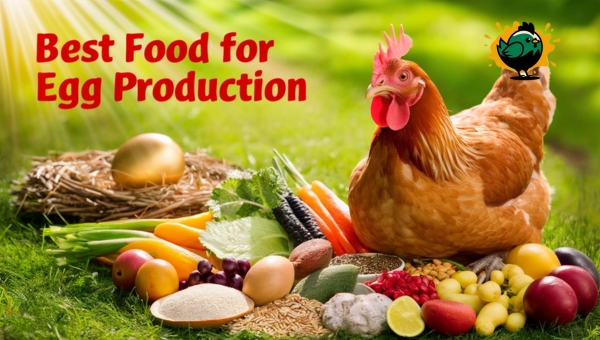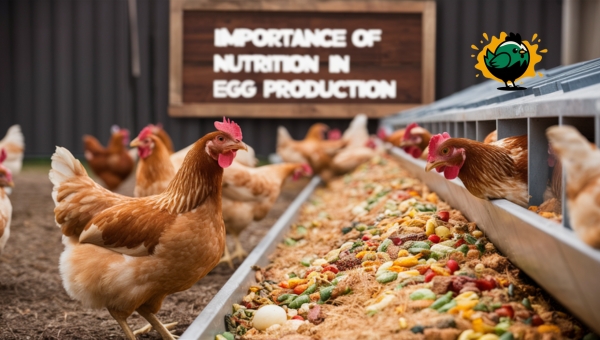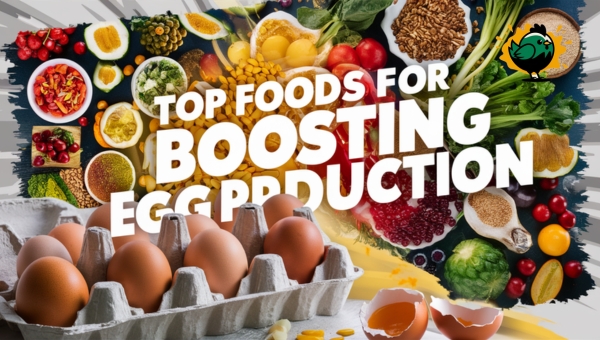Best Food for Egg Production [Boost Your Flock’s Health]

The sun rising over your backyard, the air filled with the gentle clucking of hens. Each morning, you eagerly anticipate gathering fresh eggs, each one a testament to the care and nourishment you’ve provided.
But what if I told you that the secret to getting more eggs lies in understanding the best food for egg production? By giving your hens the right nutrients, you can boost their egg-laying powers and ensure they’re happy and healthy. Let’s dive into the world of poultry diets and discover how the right food can make all the difference in egg production.
Importance of Nutrition in Egg Production
Proper nutrition is vital for laying hens, impacting both their health and egg production. Here are key reasons why nutrition matters:

- Egg Quality and Quantity: A balanced diet ensures hens produce more eggs with stronger shells and better nutritional value.
- Health Maintenance: Good nutrition boosts the immune system, helping hens resist diseases and remain productive.
- Reproductive Health: Deficiencies in nutrients can lead to issues like irregular laying patterns and reduced fertility.
- Growth and Development: Young hens need specific nutrients for growth, laying the foundation for future productivity.
- Stress Resistance: Adequate nutrition aids hens in coping with environmental stressors, maintaining consistent egg production.
Overall, a nutritious diet is the backbone of successful egg production, ensuring hens are healthy and productive.
Essential Nutrients for Laying Hens
To achieve the best food for egg production, it’s important to focus on key nutrients that support the health and productivity of laying hens.

These nutrients are essential for ensuring the hens lay high-quality eggs consistently. Let’s explore some crucial ones that are vital for egg production.
Protein
Protein is a fundamental component for egg production as it plays a significant role in forming the egg itself. It is essential for producing enzymes and hormones that regulate egg-laying processes.
Moreover, protein supports the overall health of hens by aiding in tissue repair and immune function. High-quality protein sources in their diet ensure hens remain healthy and productive.
Calcium
Calcium is critical for the formation of strong eggshells. Hens require adequate calcium levels to produce eggs with durable shells, which helps prevent breakage.
Additionally, calcium supports the bone health of hens, as they use calcium reserves from their bones for shell formation. Providing sufficient calcium in their diet is essential for maintaining both shell quality and bone strength.
Omega-3 Fatty Acids
Including omega-3 fatty acids in the diet of laying hens can enhance egg quality significantly. These fatty acids contribute to improved yolk color and nutritional value, making the eggs more appealing and beneficial for consumption.
Omega-3s also promote the overall health of hens, further supporting their ability to produce high-quality eggs consistently.
Vitamins and Minerals
Vitamins and minerals are indispensable for laying hens, as they play a role in various metabolic functions and overall well-being.
Vitamins like D3 are crucial for calcium absorption, while trace minerals such as zinc and manganese contribute to eggshell integrity. A balanced supply of these nutrients ensures optimal egg production and supports the hens’ health.
Also Read: Fighting Chicks | Causes and How to Stop Aggression?
Top Foods for Boosting Egg Production
To enhance egg production in laying hens, consider incorporating the following foods into their diet:

- Layer Pellets or Crumbles
- Formulated specifically for laying hens with balanced nutrients.
- Oyster Shells
- A natural source of calcium that supports eggshell strength.
- Flaxseed
- Rich in omega-3 fatty acids; improves yolk quality.
- Soybean Meal
- High in protein; essential for hormone production and overall health.
- Alfalfa Meal
- Provides protein and essential vitamins while improving palatability.
- Fish Meal
- Excellent source of protein and omega-3 fatty acids.
- Corn
- Provides energy; often used as a base ingredient in feed mixtures.
- Vegetable Scraps
- Can be a good source of vitamins; ensure they are safe for chickens (avoid toxic plants).
- Grit
- Essential for digestion; helps grind food in the gizzard.
Homemade Feed Mixes for Improved Egg Production
Crafting homemade feed mixes for your laying hens can significantly enhance egg production by providing tailored nutrition.
Here’s a guide to creating effective mixes:
- Basic Layer Mix:
- 50% corn
- 30% soybean meal
- 15% wheat bran
- 5% oyster shell (for essential calcium needs)
- High Protein Mix:
- 40% soybean meal
- 30% corn
- 20% alfalfa meal
- 10% fish meal (rich in omega-3s)
- Omega-3 Enrichment Mix:
- 50% corn
- 25% flaxseed
- 15% soybean meal
- 10% oyster shell
For added benefits, consider including vitamins and minerals like zinc or vitamin D3, based on your hens’ specific needs. Thoroughly mix all ingredients to ensure even distribution of nutrients, and store in a cool, dry place to maintain freshness. Creating these mixes helps ensure your hens receive a balanced diet, promoting both egg quality and hen health.
Also Read: Oregano for Chickens | The Benefits for Healthier Flocks
Benefits of Optimized Hen Diets
Optimizing the diet of hens offers several key advantages that significantly improve their productivity and well-being:
- Increased Egg Production: A balanced diet ensures hens produce more eggs, maintaining consistent laying patterns.
- Enhanced Egg Quality: With a nutrient-rich diet, hens lay eggs with stronger shells and vibrant yolks, which are more appealing and nutritious.
- Improved Health: A diet that includes essential nutrients helps boost the hens’ immune systems, making them more resilient to diseases and infections.
- Longevity: Proper nutrition extends the productive lifespan of hens, allowing them to lay eggs efficiently for a longer period.
- Cost Efficiency: Investing in a high-quality feed reduces long-term costs by maximizing the number of eggs produced per hen, thus enhancing overall farm profitability.
By focusing on these aspects, poultry owners can ensure their hens are healthy and productive, contributing to a successful egg production operation.
Conclusion
Understanding the best food for egg production is vital for anyone raising laying hens. A well-balanced diet is the cornerstone of healthy and productive hens. By ensuring they receive essential nutrients like protein, calcium, omega-3 fatty acids, and vitamins, you can significantly enhance both the quality and quantity of eggs produced.
This approach not only supports the hens’ health but also ensures optimal egg production. Investing in proper nutrition is a testament to the importance of sustainable and ethical farming practices. Explore more insightful blogs on our site to continue enhancing your knowledge about poultry care and nutrition!
